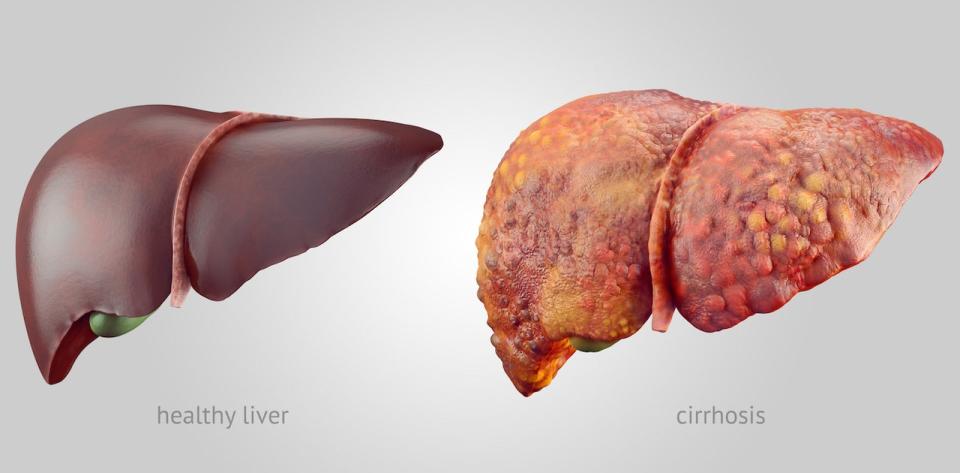FDA approves new drug to treat autoimmune liver disease: ‘Giant step forward’

A new drug to control liver disease has gotten the green light.
The U.S. Food and Drug Administration (FDA) has approved the French drugmaker Ipsen’s medication Iqirvo (elafibranor).
The drug, an 80 mg tablet administered orally once daily, is intended to treat an autoimmune cholestatic liver disease called primary biliary cholangitis (PBC).
PBC is a disease in which the immune system attacks and destroys the small bile ducts of the liver.
Without the active bile ducts, acids can then leak into the nearby tissue and cause liver damage or failure, according to the National Institutes of Health (NIH).

The disease typically involves chronic inflammation along with a stagnant build-up of bile and toxins known as cholestasis, which can lead to irreversible scarring of the liver and ultimately destroy the bile ducts.
Although PBC is considered a rare condition, it can often go undetected, some health experts said.
"PBC is likely to be way underdiagnosed," Dr. Douglas Dieterich, M.D., director of the Institute for Liver Medicine at Mount Sinai Health System in New York City, told Fox News Digital.
CAN YOU BECOME DRUNK WITHOUT DRINKING ALCOHOL? HERE’S HOW IT COULD HAPPEN
"Many people — mostly women — have elevated liver enzymes that can be easily diagnosed with a simple blood test called the AMA."
Patients typically experience severe fatigue and significant itching called pruritus.
If the disease is not treated or an individual does not respond to current therapies, it can lead to liver failure, the need for a liver transplant or even early death, according to experts.

PBC is diagnosed with a blood test that measures liver enzymes.
One common test analyzes the patient’s alkaline phosphatase (ALP), an enzyme that helps detect liver or bone disease.
Another blood test to diagnose PBC measures antimitochondrial antibodies (AMAs), which are positive in approximately 95% of patients with the condition, according to several liver experts.
One New York patient with PBC told Fox News Digital that she did not know she had a liver disease until her primary care physician performed routine blood work and noticed that her liver enzymes were elevated.
Meredith S., who withheld her last name for privacy reasons, was referred to a hepatologist, whom she credits for saving her life.
"I was feeling tired, but attributed it to working and studying at school," she told Fox News Digital.
"I was completely surprised to find out I had a liver disease and learned it was PBC."
She went on, "My doctor performed a liver biopsy and I had significant scarring of my liver in my 30s, even though I didn’t drink alcohol."

Meredith S. said she is glad there are more treatment options available, and hopes for more awareness and research of PBC.
"It is distressing to know that your body is fighting itself and you can’t figure out how to stop it," she told Fox News Digital.
Dieterich of New York City, who is also a professor of medicine at the Icahn School of Medicine at Mount Sinai, told Fox News Digital that this newly approved medication "is a giant step forward in the treatment of PBC."
He noted, "This is a giant step forward in the treatment of PBC. Up to now, there has been only one drug available to add to the urso, which is the basis for PBC treatment. Now there are two."
STUDY DISCOVERS 'TRIGGER GENE' IN IBD AS RESEARCHERS LOOK FOR DRUGS TO PREVENT THE BOWEL DISEASE
The existing drug, ursodeoxycholic acid (UDCA) — commonly called ursodial or "urso" — is a naturally occurring bile acid that has been used to treat liver disease for decades.
The newly approved Iqirvo (elafibranor) is intended to be used in combination with UDCA in patients who are not responding to the first medication on its own, or can be used on its own for people who cannot tolerate UDCA.

"For a significant number of people living with PBC, available treatments do not control the condition and may exacerbate symptoms of PBC," said Christelle Huguet, executive vice president and head of research and development at Ipsen, in a press release.
"Iqirvo demonstrated statistically significant improvements in biochemical response compared to UDCA alone. Iqirvo is therefore a much-needed treatment option and the first new medicine for PBC in nearly a decade."
The accelerated approval for Iqirvo was based on positive results from the Phase III ELATIVE trial, which showed reduced levels of the alkaline phosphatase enzyme, which is elevated in people with liver disease.
The study, published in The New England Journal of Medicine, included 161 patients with PBC who were inadequately responding to treatment with UDCA or could not tolerate that medication.
CLICK HERE TO SIGN UP FOR OUR HEALTH NEWSLETTER
Researchers found that 51% of the patients who received the elafibranor had a biochemical response, compared to only 4% who received a placebo.
After 52 weeks, the patients who were treated with elafibranor showed normalized liver enzymes, compared to 15% of patients in the placebo group.

"Data from the pivotal Phase III ELATIVE clinical trial demonstrated that Iqirvo is an effective second-line treatment for patients with PBC with favorable benefit and risk data," Dr. Kris Kowdley, a primary investigator on the ELATIVE study and the director at Liver Institute Northwest, Washington, said in a news release.
"The approval of Iqirvo will allow health care providers in the U.S. to address an unmet need, with the potential to significantly reduce ALP levels for our patients with PBC," he added.
Continued approval is contingent upon further studies showing improved survival or prevention of liver decomposition, the FDA report noted.
Some reported side effects of Iqirvo included muscle pain, rhabdomyolysis, myopathy, fractures, weight gain and drug-induced liver injury, according to the FDA report.

Also noted was the potential risk to the fetus in pregnant patients, based on animal study data.
The FDA cautioned health care providers to ensure that patients are not pregnant prior to starting the medication.
Iqirvo is also not recommended in patients who have advanced stages of cirrhosis.
For more Health articles, visit www.foxnews/health
Primary biliary cholangitis affects some 100,000 people in the United States, according to the drugmaker Ipsen.
It is a lifelong disease that can result in liver failure if left untreated, according to experts.
Original article source: FDA approves new drug to treat autoimmune liver disease: ‘Giant step forward’

